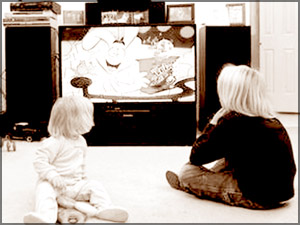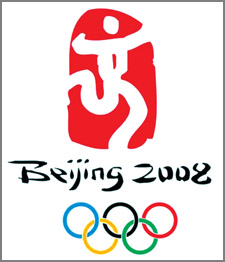|

Your say ...:
Television - what it does to your child
In the good old days, the family was the most important influence in
a child's life, but research now suggests that television is not far
behind. Television can both educate and entertain us, but it does harm
too.
Here are some of the findings of the American Academy of Paediatrics
on the impact of television. Studies show that TV viewing may lead to more aggressive behaviour, less
physical activity, altered body image, and increased use of drugs and
alcohol. But high-quality, non-violent children's shows can have a
positive effect on learning.
show that TV viewing may lead to more aggressive behaviour, less
physical activity, altered body image, and increased use of drugs and
alcohol. But high-quality, non-violent children's shows can have a
positive effect on learning.
However, for younger children, it's a different story. The first two
years of life are especially important in the growth and development of
a child's brain. During this time, children need good, positive
interaction with other children and adults to develop good language and
social skills. Learning to talk and play with others is far more
important than watching television.
Until more research is done about the effects of TV on very young
children, the American Academy of Paediatrics
does not recommend television
for children younger than two years of age.
In another study done by Robert Hancox at the University of Otago in
New Zealand, with nearly 1000 children born in Dunedin, in 1972 and
1973, the conclusions were: children who watched the least TV -
especially between the ages of five and 11 - had the highest probability
of graduating from university by the age of 26, regardless of IQ or
socio-economic status.
Those who watched the most TV, more than three hours per day, had the
highest chance of dropping out of school without qualifications.
Frederick Zimmerman and Dimitri Christakis at the University of
Washington in Seattle, found that children who watched the most TV
before the age of three performed poorest on reading and mathematics
tests at ages six and seven.
Concerned parents should think twice before placing their child in
front of the TV, as the standards of many local TV programmes which are
aired have dropped drastically.
Dr. Himantha Atukorale,
Radawana Government Hospital.
Herb cultivation programme
Four thousand less-developed villages have been selected by the
Ministry of Indigenous Medicine to carry out a herb cultivation
programme. This group herb farming system was initially introduced to
the village of Kumbukgolla in the Medawachchiya area recently.
Through this programme implemented by the Ministry with assistance
from the Ayurvedic Department, Samurdhi beneficiaries who are facing
severe poverty, are selected to cultivate herbs.
They will be guided and instructed by ayurvedic authorities to carry
out cultivation in lands coming under the Ministry of Indigenous
Medicine.
All requirements such as saplings and fertiliser will be provided by
the Ministry, while each family engaged in cultivation will be paid Rs.
400 per day. The produce will be bought by the Ayurvedic Drugs
Corporation and the income will also be divided equally among the group
members.
The pilot project at Kumbukgolla has been provided with 25 acres of
land. The project, if successful, will annually save about Rs. 200
million in foreign exchange which is used to import herbal products
annually for the manufacture of Ayurvedic medicine.
Textbooks on time
Some of you may have experienced difficulties at the beginning of a
new school year due to the non-availability of school textbooks. There
have been many instances when school textbooks had been distributed to
students many days after the commencement of the first term. There have
also been occasions when students had received textbooks after the first
term.
These setbacks are expected to be solved with the moves being made by
the Ministry of Education to distribute textbooks before the
commencement of next year's first term. The Education Publication
Commission of the Ministry has been advised by the Education Minister to
distribute textbooks to every student by next January.
An officer has also been appointed to ensure the smooth distribution
of books throughout the country. Distribution will be carried out by the
Zonal Education Office under the supervision of the Provincial
Educational Office and the Education Publication Commission. The
security forces have been entrusted with the task of distribution in the
North and East.
Monument for Olympics
Most Asians are excitedly awaiting the Beijing Olympics next year.
It's special this time as the most important sporting event in the world
is being held in our own continent. The whole continent, including Sri
Lanka, is getting ready for this monumental event.
As a means of marking the Beijing Olympics, the Urban Development and
Sacred Area Development Ministry and the Urban Development Authority (UDA) are planning to put up a
monument for the Olympics at Parliament Junction, Battaramulla.
and the Urban Development Authority (UDA) are planning to put up a
monument for the Olympics at Parliament Junction, Battaramulla.
The goal is to fasten urban development activities in Sri Lanka
parallel to the Olympics. The UDA has also arranged a mobile programme
under the theme 'Olympic Sithuvili'.
The monument will bear a design of four lions belonging to the
Yapahuwa era and also other historical facets of the country. A
computerised electronic clock will be set up on top of the monument
which is estimated to cost nearly Rs. 2.5 million. Construction work is
expected to be completed by August 8, 2008 and its opening is scheduled
on the day on which the Olympic ceremony commences.
Through this project, the Ministry and the UDA intends to provide
schoolchildren, university students and rural folk an understanding
about how an Olympic festival could assist a country in its development
drive.
India may have just 1,500 tigers
India may have just 1,300 to 1,500 tigers left - less than half of
the number believed to exist five years ago - conservationists say. The final results of a state-by-state census are
expected in December, but at a recent conservation meeting, a noted
Indian tiger expert put the number of the cats left in the country at
1,500 or fewer.
- conservationists say. The final results of a state-by-state census are
expected in December, but at a recent conservation meeting, a noted
Indian tiger expert put the number of the cats left in the country at
1,500 or fewer.
"The indications are that the present tiger population in India is
between 1,300 and 1,500," said conservationist Valmik Thapar in New
Delhi.
Thapar said both wildlife experts and government officials were in
agreement on the figure, a sharp drop from the 3,700 tigers believed to
live in India in 2002.
Other wildlife experts, however, said the final figure from the new
tally, which uses technology such as camera traps rather than relying on
pug marks (paw prints) as past surveys did, was likely to be close to
the one given by Thapar.
AFP
Water summit in December
The first Asia Pacific Water Summit (APWS) will be held in the
Japanese city of Beppu in December. Forty nine governments in the region
have already expressed interest in the event.
It's being organised by the Asia Pacific Water Forum (APWF), an
independent, non-profit, non-political network launched in September
last year at the headquarters of the Asian Development Bank (ADB) in
Manila, Philippines.
The Forum aims to get the support of governments, international donor
and development agencies and civil society groups to help achieve the
United Nations Millennium Development Goal (MDG) of halving the number
of people without access to clean water and improved sanitation by 2015.
A WHO-UNICEF report has revealed that 655 million people in the
region still lack access to safe drinking water, while 1.9 billion lack
access to basic sanitation. The Asia-Pacific region accounted for 80 per
cent of the total global deaths due to water-related disasters between
2001-2005, according to the international disasters database.
'Asia Water Watch 2015', the ADB report of last year estimated that
eight billion dollars needs to be invested annually on water and
sanitation in the region in the coming decade to achieve the MDG target
by 2015.
|
